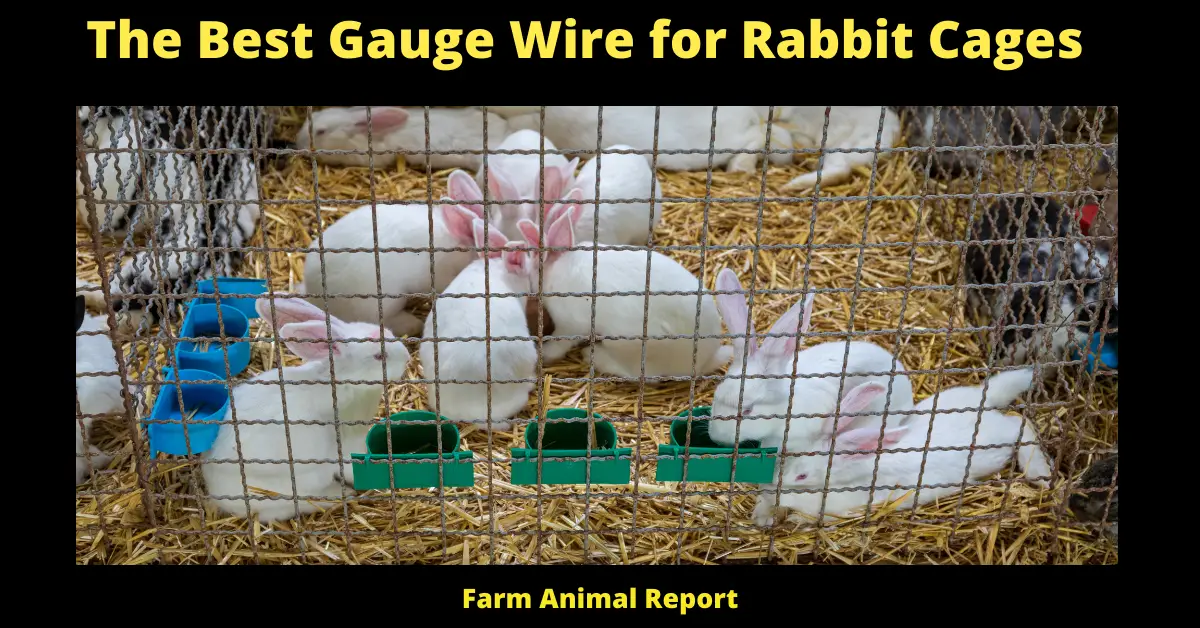Rabbit Cage Floor Wire
Wire can be a pain to work with, but it is essential when it comes to building wire rabbit cages.
As a general rule, The wire gauge you use will vary based on the wire type and wire thickness. For example, if you are using 11 gauge wire for your wire rabbit cage then you should know that this is not suitable for rabbits because they are prone to chewing through thin wires. If you do want to use an 11 gauge wire in your wire rabbit cage then make sure it is galvanized or coated in plastic so that the rabbits cannot chew through it which could result in serious injury to them. Rabbit Cage Floor Wire
As a General Rule Best Wire Guages for Rabbit wire cages are
- 16 Guage Welded Wire is excellent for small rabbit breeds
- 14 Guage for Larger Rabbit Breeds
- Wire Mesh Hole size should be 1″ x 2″ or smaller – Top and Sides
- Floors should be 14 Guage – with hole size 1/2″ x 1″ allows manure to drop through
- Baby Saver wire- Used on Sides of Breeding Doe Cages – bottom on sides is 1/2″ x 1″, and it gets larger as it moves up.
- If Sore Hocks Develop – You can purchase Removeable hard plastic slotted mats
Best Locations for Wire Rabbit Cages Wire
Inside Your House for Pet Rabbits
Wire for Rabbit Cages – Wire cages are great because they can be placed in your bedroom, kitchen, laundry room or garage wire cages are great because they can be placed directly on the floor wire cages should have a waterproof tray to better contain messes wire rabbit cages need to be moved often wire the cage well so your rabbit does not escape make sure there is no place for him/her to get stuck between wires
See Amazons Resources for Looking at Available Rabbit Hutches
They can be in your bedroom, kitchen, laundry room, garage, basement or any other area in your home.
Be sure to wire the cage well so your rabbit does not escape and make sure that there is no place for him/her to get stuck between wire holes (especially if you have a large breed like Flemish Giants).
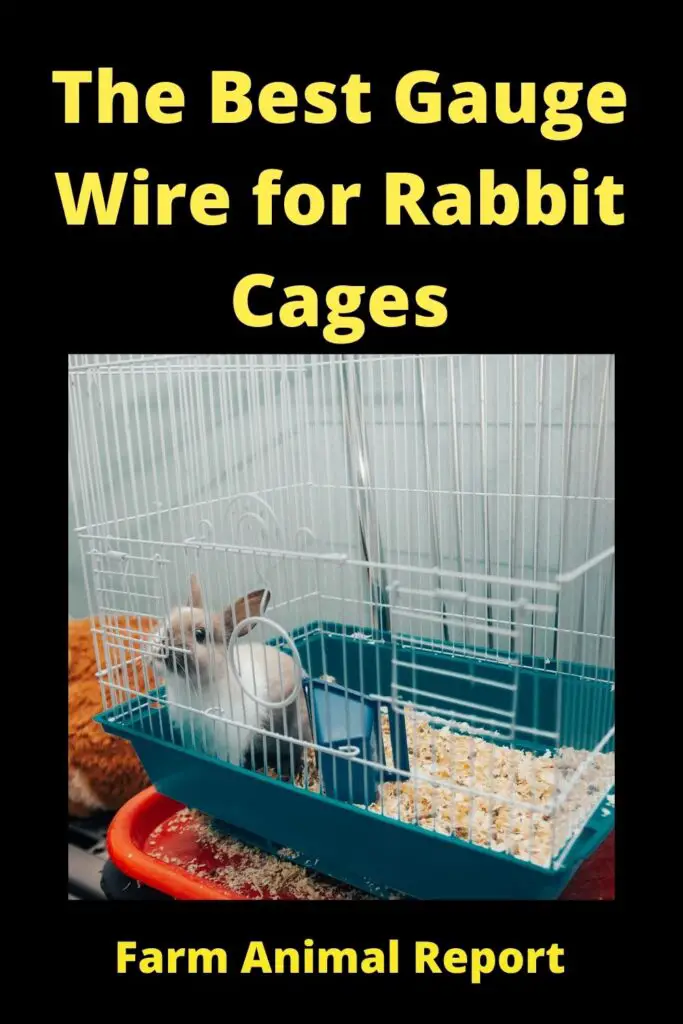
Basements
You can keep your pet rabbit in the basement. People often keep their rabbits in an unheated basement that has enough room for the rabbit to hop around. If your basement is large and cozy, you can place a litter box down there too. However, be mindful of any areas with severe dampness or water damage because this could cause problems like bacteria growth on the floor where your bunny might be walking.
A basement is an ideal place for a rabbit to live because it’s usually cool and doesn’t experience much activity so the bunny won’t be frightened by noises or shadows. However, you should still allow your pet some time each day to enjoy the company of other pets in your home like cats and dogs that can keep him happy and healthy.
If you have a finished basement, there are many ways to turn this area into an inviting place for your rabbit. You can cover any hard surfaces with soft bedding or rugs so that the floor feels more comfortable under their feet and they won’t be frightened by noises from above when someone walks on the floorboards above them. The main issue with a finished basement is that it’s usually too cold to be comfortable for your rabbit, so you’ll need to make sure he has access to an area where temperatures are more moderate.
Basements can save lives during severe weather because they’re protected from the outside elements. Be mindful of any potential water damage or rodent infestations in your basement, because these are common problems that can make your rabbit sick. If you have a hole in the wall or floor where water is leaking into the room, try to seal it up immediately with some steel wool and spackle so that moisture won’t be able to get down onto the flooring easily.
Rabbit-proofing your unfinished basement is very important before you bring your pet home. Most rabbits will chew on anything they can reach, so be sure to make all electrical cords and other items out of their reaching distance. You should also block off any stairs with a baby gate or some sturdy boxes if possible because it’s much too easy for your rabbit to fall down the steps in an accident.
Garage
Rabbits don’t need a big space to live. They can be kept in your garage which is usually available for rabbits. Just make sure it has enough ventilation and the temperature stays between 50°F (15°C) to 80°F (27°C). If you have air conditioning, then keep it at around 50°F (15°C).
Breeding Rabbits
If you are breeding rabbits you will need more space than you will need to keep them in for other reasons. You can use a hutch but it is important that there are nesting boxes and plenty of straw inside the hutches so that your rabbits have somewhere comfortable to lay their babies. In addition, if possible, add some soft material outside the box because this makes an ideal nest when they give birth.
If you want to breed rabbits and keep them in a hutch, the size of the hutch will need to be at least twice as big as an individual’s body length. It is also recommended that they have room for exercise runs if possible so that they can get out into fresh air. You should definitely provide water troughs rather than water bottles because the rabbits are more likely to get their heads stuck in water bottles.
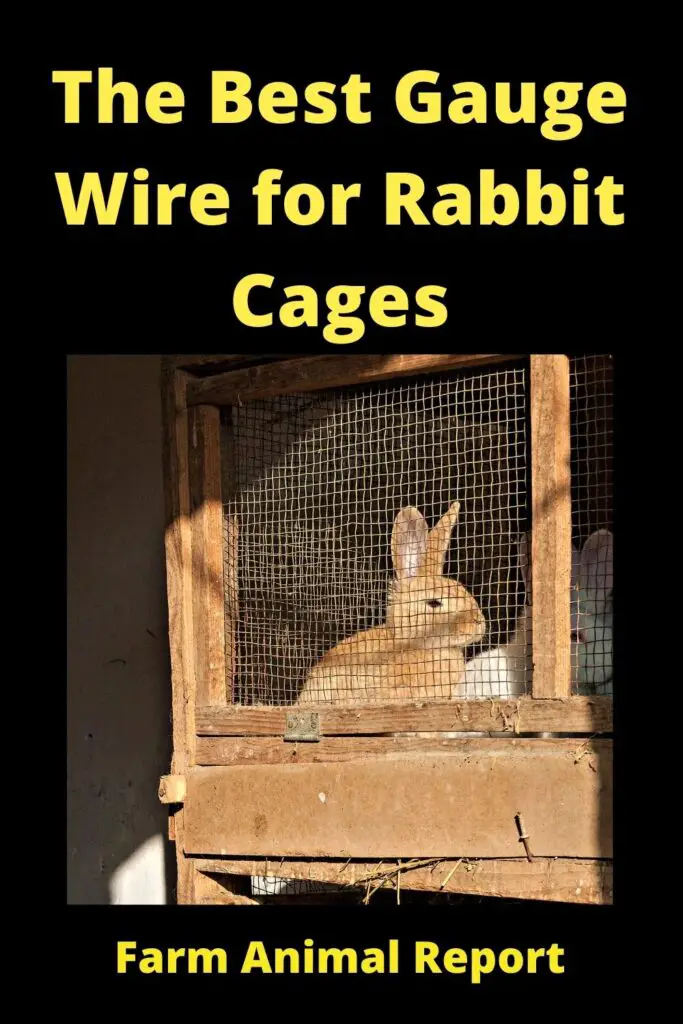
If you have a large garden, it is possible to keep your pet rabbit outside ( Free Range) all of the time if they do not mind being fenced in by chicken wire or something similar with smaller holes in for them to go through. If this is not an option then they can be kept indoors in a pen or cage, but you will need to make sure that it is somewhere where they have been before so that they are used to the smells and sounds.
If your pet rabbit has a very large hutch then this will also allow them some freedom as long as there is enough room for nesting places inside of their pen. This is the best option for rabbits that are being kept in outdoor runs because it allows them to have some freedom without getting into any trouble or escaping through holes that you may not know about yet!
When your pet rabbit has babies, if they do breed well then you will need to build a larger hutch so that there is plenty of room for all of your rabbits to live happily. If you are keeping the babies in with their mother then make sure that there is plenty of room so that they have enough space between them and do not get squashed.
If you want to breed pet rabbits, it is important to know what sort of hutch or pen will be best for them because they need plenty of space to live in. You should also think about whether or not you want them all to live together, with their babies living separately from the mother until around three months old when she will no longer be feeding them anyway.
If you are Breeding Rabbits on a Large scale outside barns will be the best option for you. Outside Hutches with Roofs are the best option.
Ventilation
Where ever you keep your rabbits on a small scale or large ventilation is a very important factor. The best way to ventilate your hutch is with a combination of cross ventilation and fresh air coming in through the bottom or through an opening on top, depending on which direction you have it facing.
Properly designed outdoor rabbit runs make use of microclimate-appropriate wind currents for cooling purposes as well as natural light and location.
Extreme weather Hot / Cold
Rabbit Protection from cold or heat is a serious issue for those living in extreme climates. Chill Factors all are thought to be at home in places where the weather is mild.
In hot climates, rabbits are usually kept indoors and live comfortably because of their fur coats. In colder regions, they need a place that can provide them with shelter from extreme cold or heat. If an outdoor pen is used as a shed for protection from heat, make sure it gets plenty of sunlight.
However, if it is used to provide shelter from cold temperatures, make sure that the rabbits cannot escape and be exposed to the elements by accident or design.
Types of Rabbit Cages
Wooden
There are a few types of rabbit cages available on the market. The most common one is a wire cage with an open top and bottom, which provides your pet enough space to move around but also keeps it safe from predators or other animals that might harm them such as dogs. As for the walls, they should be solid enough so that rabbits cannot chew on them.
Some also use Wooden Hutches or other types of rabbit cages, which are not as popular but still provide a great environment for your pet.
A wooden Hutch with wire for ventilation can give great homes for your rabbits. It is also easier to clean up when the time comes.
A Four hole hutch is also a great option for your rabbits, it is sized for 4 medium-sized rabbits.
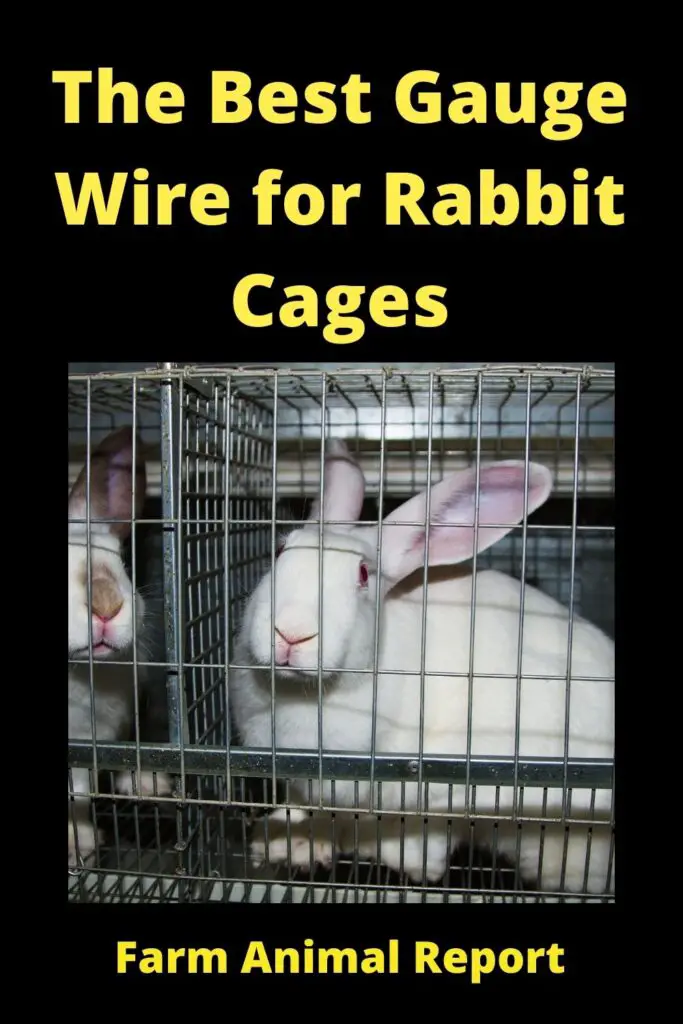
Wire Cages
Many Breeders use wire cages for their rabbits, but they are also great options for pet owners. They provide proper ventilation so that your rabbit can live in them all year round without any issues.
They should be at least 20” tall to allow the animal enough space to stand up on its back legs and move comfortably inside of it. It is important not to overcrowd the animal as it can cause stress and aggression.
For those of you that want to breed rabbits, wire cages are also a great option for this purpose as well. They give the animals enough space so they do not hurt each other and allow them to reproduce on their own time schedule.
Many homeowners opt for these types of rabbit cages because they can be easily cleaned and do not take up too much space in the house. They are also fairly sturdy and will last a long time if properly maintained.
If you want to keep your rabbit outside, wire cages might prove difficult as they could get destroyed by other animals or weather conditions such as rain or snow which means buying another one would be necessary.
Hutches & Hutch Accessories
If you are looking for something that your rabbit can move around in, hutches are the perfect option to consider. They provide enough space so that rabbits can feel comfortable and at ease but also come with accessories such as water bottles or food dish holders which makes caring for them easier than ever before. There are a few different types of hutches available on the market, but one of the most popular ones is a four-holer hutch which can fit up to four medium-sized rabbits.
Wire cages are excellent for housing rabbits it provides
1) Ease of Cleaning
2) Ventilation
Wire cages are excellent for housing rabbits. It provides the following benefits:
• Ease of cleaning
• Ventilation
– There is no doubt that rabbits need to be kept in clean living conditions and having a wire cage makes this simple task possible. The flooring may be easily removed which allows you to quickly sweep or hose away from any droppings.
– Being able to easily view the rabbit from all angles allows you to keep an eye on them and their surroundings at all times, which can help in the early detection of illness or injury. Keeping a wire cage also provides access for daily interaction with your pet as well as placement of toys and treats that will encourage exercise and play.
Allows rabbit manure to fall through the wire mesh, which makes cleaning easier.
– The cage is made of a strong mesh that allows air to circulate and fresh air during warm weather while keeping your pet safe from drafts or other elements such as rain etc.
Allows for easy access so you can play with your bunny daily! Plus it helps keep their mind active and their bodies fit.
– The wire cage also means that the rabbit will be protected from draughts in winter, but still able to see what is going on outside which helps them feel less isolated.
Stacking Cages
When wire cages are stacked on top of one another, you can fit more rabbits into a smaller area. This is beneficial for several reasons: the rabbit’s living space becomes cleaner and easier to maintain; your labor costs decrease because there doesn’t need to be as much time spent cleaning up messes or feeding each individual animal, and your rabbits are able to live more like they would in the wild.
When stacking cages you need to capture urine and feces from falling on lower-level rabbits.
When only having one level of rabbits you can allow the urine and feces down into capture pans or boxes.
When stacking cages you need to make sure wire spacing is appropriate.
A rabbit’s foot can get caught in the wire spacing which could lead to injuries, illness, or death.
If a rabbit’s foot gets stuck between the wires, they are unable to escape on their own and often have serious consequences including broken bones, amputations, or serious infections.
Worm Breeding from Rabbit Manure
Many Rabbit Breeders use waste management principles to at the same time manage waste and have another cash-producing item in rabbit manure.
Rabbit manure can be a great worm’s breeding medium. There are many red worms that live in rabbit manure, but they depend on small amounts of oxygen to survive. When you create worm compost from rabbit waste the process is often called vermicomposting and uses earthworm species such as Eisenia fetida (red wiggle) and Eisenia andrei (African nightcrawlers).
Rabbit manure vermicompost is a great addition to any existing worm bin or can be used in the bottom of the new setup. It will help introduce a large number of microorganisms that are beneficial to your worm’s health, but it also contains high amounts of soluble nitrogen so can cause ammonia problems if not properly managed.
Rabbit Manure Vermicompost can be used to make a direct application worm tea or it can also be mixed with other composting materials (like your horse manure) and applied as an additive.
Best Wire for Top and sides of cages
All wire should be galvanized because it is exposed to the weather. Also, Exposure to urine and feces will cause corrosion. You also need to do be able to do regular cleaning and sanitizing of your cages.
Galvanized welded wire is best because it is stronger than regular wire.
However, the fencing should be sturdy enough that you can’t bend it just by hand pressure. Also, If a rabbit has its front paws on top of the cage it shouldn’t be able to push its way out through the gaps between wires.
There are some types of wire mesh that are sold for rabbits, but they aren’t recommended because the wire is too lightweight. Also, The spacing between wires is wider than what you need to prevent your rabbit from squeezing through it.
The top and sides of Rabbit cages should be made of wire that is ½ inch for pet rabbits and larger, and ¼ to ½ inches for smaller breeds. Also, The bottom can be made with a mesh material so the urine will drain out. If you use hardware cloth or chicken wire it should have openings no bigger than one-inch squares because if your rabbit gets its head through the wire it could get stuck.
With Wire gauges the Higher the number the Thinner the wire.
- 16 Guage Welded Wire is excellent for small rabbit breeds
- 14 Guage for Larger Rabbit Breeds
- Wire Mesh Hole size should be 1″ x 2″ or smaller – Top and Sides
- Floors should be 14 Guage – with hole size 1/2″ x 1″ allows amnure to drop through
- Baby Saver wire- Used on Sides of Breeding Doe Cages – bottom on sides is 1/2″ x 1″, and it gets larger as it moves up.
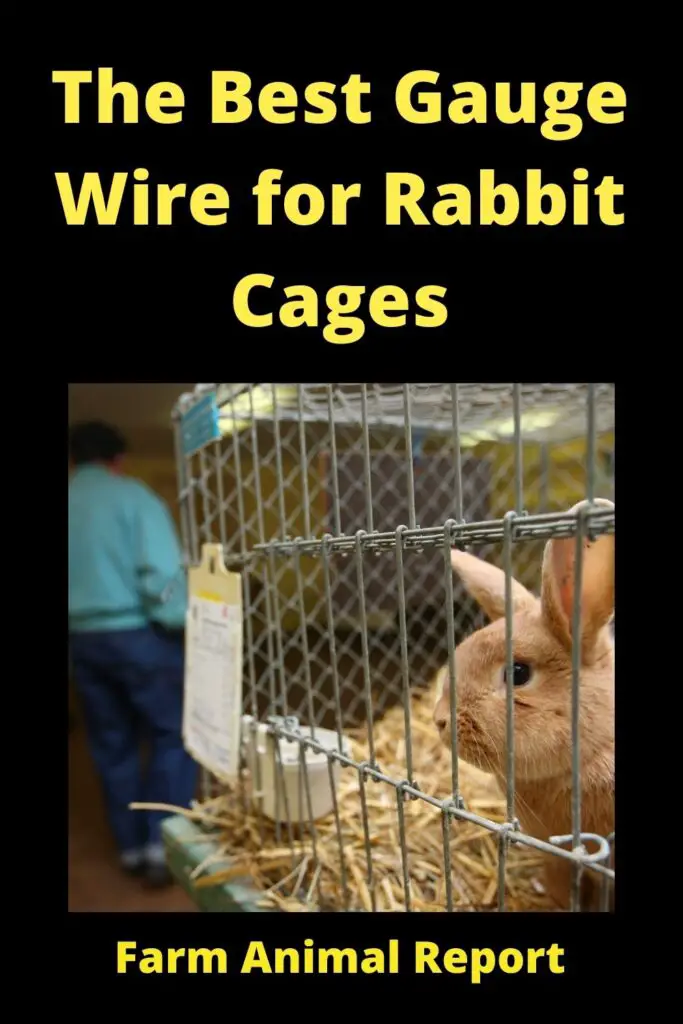
Rabbit Baby Saving Wire
This wire is great for all of your rabbit cages and hutches. It is a 24″ long, ½” by ¾” wire that comes with four different size links to fit any sized cage or hutch.
The small links are used when you have the smaller grids on the flooring of the cage itself where larger ones will not properly support it without bending or breaking.
This wire is great for all of your rabbit cages and hutches. It is a 24″ long, ½” by ¾” wire that comes with four different size links to fit any sized cage or hutch. The small links are used when you have the smaller grids on the flooring of the cage itself where larger ones will not properly support it without bending or breaking.
The large links are used when you have the larger grids on the flooring of the cage itself where smaller ones will not properly support it without bending or breaking. You can also use this wire for your hutches if they do not already come with a top that has bars spaced out far enough apart.
What are Sore Hocks in Rabbits?
Sore hocks are a very common problem in rabbits, especially if they’re kept inside or not allowed to run around on the floor. When you put your rabbit back into his cage after handling him for some time, he may begin to limp and squeak as he walks. This is due to pressure being applied onto the bottom of his feet, which causes them to become sore. This can be prevented by allowing your rabbits to roam around on the floor so they don’t need to walk on their hocks for extended periods of time.
If the cage floor wire is too large, the rabbit’s feet get caught in it. This will cause their feet to become sore and cut. Also if your rabbit is standing in urine and feces it will also cause sore hocks.
Make sure to keep your rabbits’ hocks clean so they don’t get infected. Keep the nails trimmed on their feet too, which will help prevent soreness when walking around. If you suspect that your rabbit has a bacterial infection or parasites then take him to the vet for treatment.
What is the Best Thing to Line a Pet Rabbit Cage?
The best thing to line a rabbit cage is wood chips. Wood chips provide insulation and absorb odors and droppings so you don’t have to use as many bedding materials in the litter box, which means less work for you! You also want to avoid cedar or pine shavings because they can cause respiratory problems in some rabbits.
Can Rabbits Chew 20 Gauge Wire?
Rabbits can chew through 20 gauge wire. If you have a rabbit that chews on the cage, securing heavier-duty hardware cloth over the wooden frame of your hutch will keep it from chewing its way out and finding ways to run away or hurt itself.
Can rabbits chew 16-gauge wire?
Yes, rabbits can chew through wire lighter than 16-gauge wire, but it takes a while. They are able to do so because their teeth grow continuously throughout their lives. If they don’t wear them down by chewing on things then the teeth will become long and sharp enough that it will be dangerous for you to handle or keep your rabbit in its cage.
Always give rabbits something in their cages to chew on – also always monitor the condition of your cages from rabbit chewing.
Can I use Chicken Wire for Rabbit Cages?
However, this is an extremely bad idea and will not work out well. Chicken or aviary mesh may seem like a good alternative but it is too flimsy to be used as the only material within your bunny’s enclosure. A stronger type of wire that meshes should be used along with the chicken wire. The best choice would be to use a heavy gauge welded wire mesh that is made out of at least 16-gauges steel.
Yes, you can use chicken or aviary mesh for your rabbit cage but this will not work out well and should only be used in combination with another material such
Is Salvanized wire safe for Rabbits?
Yes, galvanized wire is safe for rabbits. It is corrosion-resistant and is safe to use as a long-term home for your rabbit. The galvanized wire will not harm rabbits if used properly so it can be considered one of the safest types of fencing you could install in their enclosure.
18 Ways to Make Money by Rabbit Farming—Extensive Guidelines for Rabbit Farmers
Can you use Hardware Cloth for Rabbit Cages?
No, hardware cloth is not safe for rabbits.
It might seem like a good idea to use this type of wire mesh because it is much lighter than regular welded wire but it will rust and can injure your rabbit when they try to chew on the metal edges or get their paws caught in between the wires. While galvanized steel is safe to use as a permanent fence, hardware cloth should be avoided at all costs.
Where to Buy Wire Rabbit Cages
- Local Pet stores – While your local pet store might not have the exact cage you are looking for, they will likely be able to order it for you.
- Your Local Rabbit Rescue – If there is a rabbit rescue in your area, they may keep rabbits who need homes and also sell wire cages. Craigslist – Keep an eye out on your local craigslist page as people often sell things like rabbit cages for a very good price.
- Online Stores – If you are looking to buy your wire cage online, there are many options available.
- Rabbit shows– Often at rabbit shows you can find cages for an affordable price.
- Mail-order companies – There are many places you can order your rabbit cage from.
- Tractor Supply
- Farm Supply
Final Thoughts
in conclusion, there are many different types of wire you can use for your rabbit cage, but some should be avoided.
Wire with a 16-gauge steel structure is ideal for rabbits as it won’t rust and will be easy to clean. Chicken wire should only ever be used in combination with another material, such as welded wire mesh because the chicken wire isn’t strong enough on its own. Hardware cloth is not safe for use even though galvanized steel is safe for rabbits. Always monitor the condition of your cages from rabbit chewing to avoid injury or death by accident.


